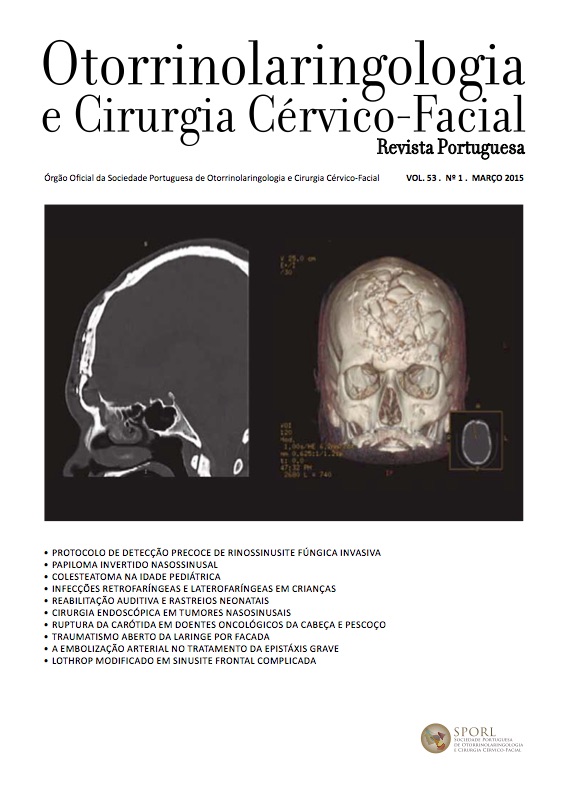Arterial embolization in severe epistaxis management: clinical cases
DOI:
https://doi.org/10.34631/sporl.563Keywords:
epistaxis, endovascular embolizationAbstract
Epistaxis is one of the most common ENT emergencies. In refractory cases to traditional measures (chemical or electrical cauterization, anterior and / or posterior packing; systemic antifibrinolytic) it may be necessary to resort to surgical ligation or arterial embolization. Through four clinical case reports, this study aims to analyze the role of arterial embolization in the treatment of severe, refractory epistaxis to initial therapeutic measures.
Endovascular embolization has application in multiple clinical situations in otorhinolaryngology showing high success rate in the treatment of refractory epistaxis. The major complications (cerebrovascular embolism and skin necrosis) are rare. The main advantages are: it is a minimally invasive procedure, it may be performed under local anaesthesia, allows a super-selective arterial obliteration and establishment of an etiological diagnosis in some cases. However, further studies, with higher levels of evidence, are required in the comparison of endovascular vs. surgical approach.
Downloads
References
Willems PWA, Farb RI, Agid R. Endovascular Treatment of epistaxis. Am J Neuroradiol. 2009; 30: 1637-45.
Santaolalla F, Araluce I, Zabala A, López A et al. Efficacy of selective percutaneous embolization for the treatment of intractable posterior epistaxis and juvenile nasopharyngeal angiofibroma. Acta Oto-Laryngologica. 2009; 129: 1456-1462.
Douglas R. Wormald PJ. Update on epistáxis. Curr Opin Otolaryngol Head Neck Surg. 2007; 15: 180-183.
Christensen NP, Smith DS, Barnwell SL, Wax MK. Arterial Embolization in the Management of Posterior Epistaxis. Otolaryngology-Head and Neck Surgery. 2005; 133: 748-753.
Melia L, McGarry G. Epistaxis: update on management. Curr opin Otolaryngol Head Neck Surg. 2011; 19: 30-35.
McGarry GW. Epistaxis. Scott Brown Edition. 2008; Cp126; pg: 1596-1608
Strach K, Schröck A, WilhelmK, Greschus S et al. Endovascular Treatment of Epistaxis. Indications, Management and Outcome. Cardiovasc Intervent Radiol. 2011; 34: 1190-1198.
Sadri M. Midwinter K. Ahmed A. Parker A. Assessment of safety and efficacy of arterial embolization in the management of intractable epistáxis. Eur Arch Otorhinolaryngol. 2006; 263: 560-566
Risley J, Mann K, Jones NS. The role of embolization in ENT: an update. The Journal of Laryngology & Otology. 2011; 1-8.
Rudmik L. Smith TL.Management of intracatable epistaxis. Am J Rhinol Allergy . 2012. 26, 55-60.
Fukutsuji K. et al. Superselective angiographic embolization for intractable epistaxis. Acta Oto-Laryngologica. 2008; 128: 556-560.
Ntomouchtsis A, Venetis G, Zouloumis L, Lazaridis N. Ischemic necrosis of nose and palate after embolization for epistaxis. A case
report. Oral Maxillofacial Surg. 2010; 14:123-127.






